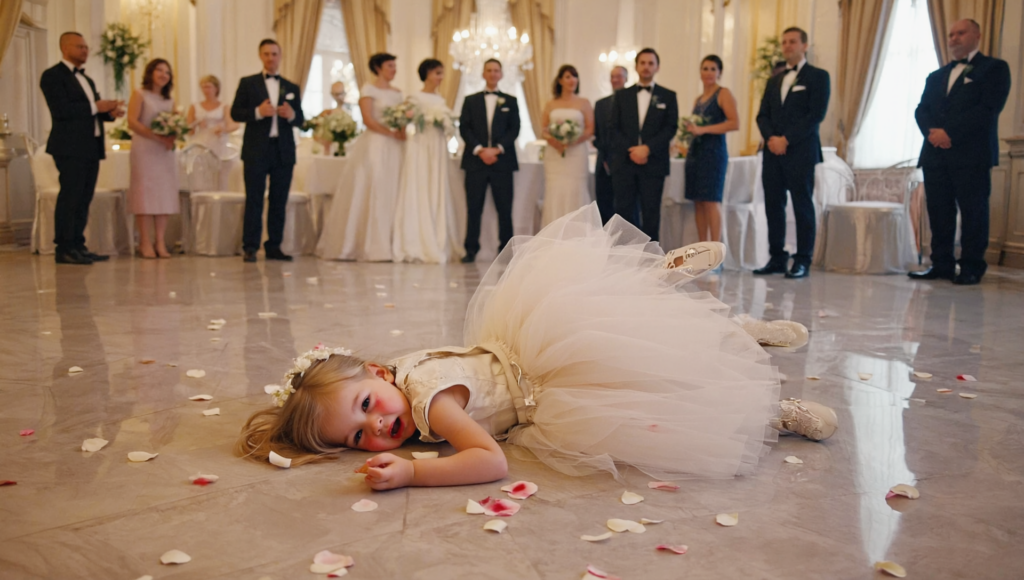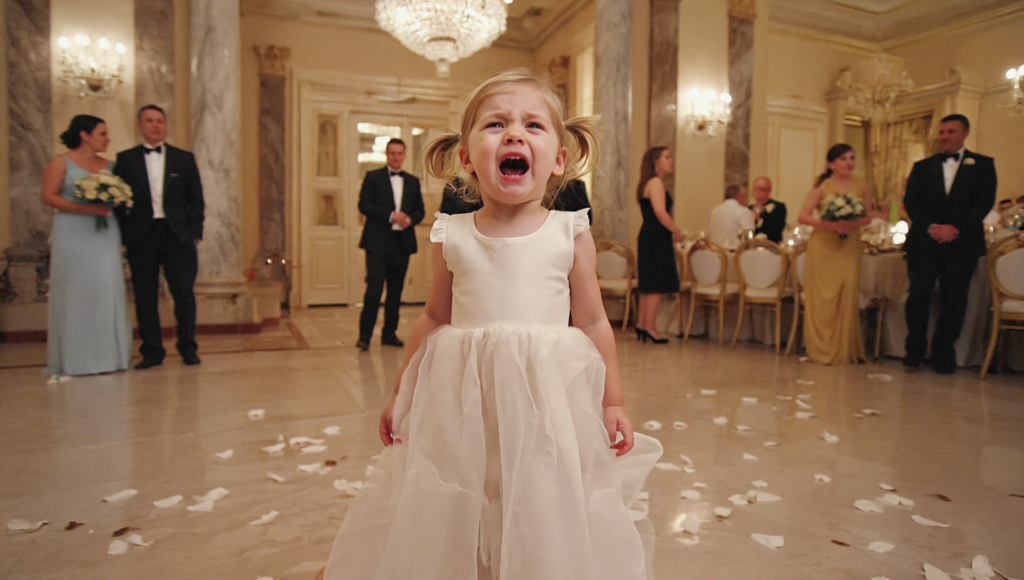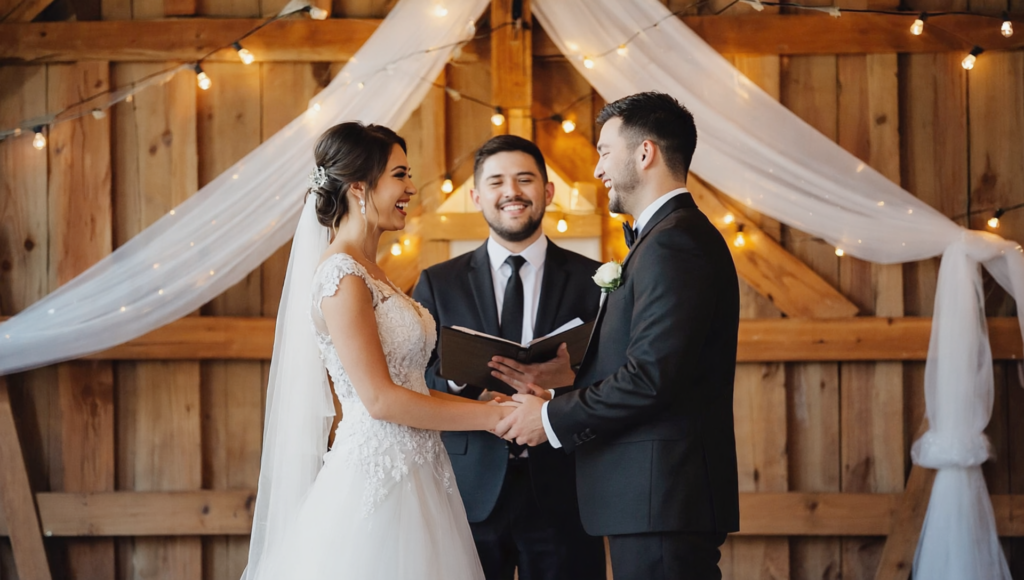Summary: Planning an adults-only wedding? You’re not alone. Many couples grapple with how to say “no kids” on the invite without ruffling feathers. This guide explains why you might choose a child-free celebration, and exactly how to say no kids are invited on your wedding invitation in a tactful and polite manner. Learn invitation wording examples, tips for spreading the word (with a smile), and strategies for handling pushback. That way, you can have the wedding day you want while keeping the peace.
Why Have a No-Kids (Adults-Only) Wedding?
Weddings are meant to be fun, and sometimes that means celebrating without little ones underfoot. Couples often choose an adults-only wedding for practical reasons: budget, venue capacity, and ambiance. Kids at your wedding add to the guest count (and cost) of a wedding . Likewise, some venues simply aren’t suitable for children due to space or safety constraints.
Then there’s the vibe—you might envision a late-night dance party with a free-flowing bar, which is easier when no toddlers are melting down past bedtime. You don’t have to dislike kids to want an adult-only celebration; it’s about crafting the experience you want. And you’re not alone: a recent survey found that 35% of couples hosted an adults-only wedding in 2022 , so a child-free reception is more common than you might think.
Is It Okay Not to Invite Children to Your Wedding?
In a word, yes. It’s your wedding, so you get to decide the guest list. Proper etiquette says it’s perfectly acceptable to have a child-free wedding. Don’t let anyone guilt you into thinking you must invite children. You’re not a villain for wanting a night just for adults. Most parents will understand (some might even appreciate the excuse for a kid-free night!). Be confident that an adults-only policy is fine, as long as you communicate it clearly. Remember, you are justified in making this choice, and parents are equally justified in deciding whether to attend or not if childcare is an issue . In short: you can love kids and still choose an adults-only wedding—no apology needed.
How to Say No Kids Are Invited On Your Wedding Invitation — But Politely
When it comes to wording, be clear but courteous. You don’t need a long explanation on your invitation—just a brief note that gets the message across. For example, a simple “Adults-only reception” or “We respectfully ask that no children attend” conveys the policy politely. You can also frame it as a positive: “To allow all guests a night of relaxation, we have chosen to keep our wedding adults-only. Thank you for your understanding.” .
The key is to use phrasing that is firm yet polite, and to include it somewhere guests will notice. Many couples put a short line at the bottom of the invite or on a separate info card. Adding a “thank you for understanding” or similar courteous touch helps soften the directive. Humor can be used if it fits your crowd—for instance, “We love your kids, but you deserve a night off! Adults only, please.”—but use it only if you’re sure it won’t offend . In all cases, keep the tone warm and respectful. Your goal is a clear message that still sounds like it’s coming from a gracious host.
What Invitation Wording Examples Can You Use for an Adults-Only Wedding?
If you’re looking for specific phrasing, here are a few wedding invitation examples for examples of a no-kids policy:
• Straightforward: “Please note that this will be an adults-only celebration.” (Short, sweet, and clear .)
• Respectfully Worded: “We respectfully and politely request no children under 18 at the reception. Thank you for your understanding.”
• Due to Constraints: “Due to limited space, we are unable to accommodate children at our wedding.”
• Lighthearted: “We love your children, but we thought you’d enjoy a night off – adults only, please!”
Notice how these express the message gently (using phrases like “with respect” and noting “we hope you understand”) while still clearly stating it’s an adult-only occasion. Feel free to adapt any of these examples to fit your style. The important thing is that your wording is specific and unambiguous. One well-crafted line is all you need to prevent confusion about whether children are invited.
Where Should You Announce the No-Kids Policy?
Where (and how) you tell guests about the adults-only policy can matter. Traditional etiquette advises against printing “No Children” on the main invitation itself. Instead, the classic approach is to address your envelopes only to the people invited (omitting the kids’ names) and, if needed, include a separate note.
In modern practice, many couples do add a brief line on a details card or their wedding website to make things extra clear. For example, your wedding website’s FAQ might say: “Are kids invited? We regretfully cannot accommodate children at our celebration – thank you for understanding.” You can also include an insert with the invitation that says something like “Adult reception to follow” or one of the wording examples above.
The key is to put the notice in a place guests will see it (invitation insert, info card, or website) without seeming heavy-handed. One or two mentions in print and online will usually do the trick. Some couples even display a small sign at the reception entrance as a final reminder (yes, you can even find premade “No Children Allowed” signs online ).

How Do You Let Guests Know Their Children Aren’t Invited?
Aside from the written word, it helps to spread the news personally. Tell your immediate family and wedding party about your no-kids policy early, so they can help answer questions and reinforce it if needed . If you anticipate certain guests might assume their children are invited to the ceremony and reception, consider reaching out to gently clarify. You might say something like, “We wanted to let you know our wedding will be adults-only, but we really hope you two can still come and enjoy the evening.” Most people will appreciate the heads-up.
Despite your best efforts, you might still get an RSVP that includes children or a guest directly asking if they can bring their kids. In those cases, be polite but firm. Respond with a warm but clear message reiterating that the event is adult-only. For example, “I’m so sorry, but we’re unable to accommodate children at our wedding. We hope you’ll still be able to join us and celebrate with us!” . This makes your position clear without singling anyone out or being negative about children. Usually, once you explain, guests will say “no problem” and make other arrangements.
Should You Make Any Exceptions for Family or Wedding Party Kids?
Generally, a no-kids policy works best if it’s all-or-nothing—consistency prevents hurt feelings . However, you might choose to allow a few special cases, such as infants, your own children, or kids in the wedding party (flower girl, ring bearer). Some couples also make an exception for their nieces and nephews or children of immediate family. If you go this route, be very clear about it so other guests aren’t confused. You can note the exception on your invite or website. For example: “Due to space constraints, we are only able to invite the children of immediate family to our wedding.” . That way everyone knows the rule is being applied fairly.
Be aware that if Cousin Jane sees Uncle Bob’s kids at the wedding when she was told it was child-free, there could be drama. To avoid this, inform those who are allowed to bring kids to keep it low-key, and consider mentioning the arrangement privately to others if needed. The simpler solution, though, is to stick to adults-only across the board with no exceptions (aside from perhaps tiny babies). It may be tough to say no to one or two beloved kids, but it will save you a lot of juggling and potential resentment.
How Do You Handle Pushback and Difficult Conversations?
Even with polite wording and advance notice, you might get a little pushback. The key is to stand your ground with grace. If a guest says they can’t attend because of your no-kids rule, accept their decision graciously. Don’t take it personally—you’re perfectly within your rights, and they are within theirs . If someone asks for an exception (“Can’t I just bring my baby?”), respond firmly but kindly: “I’m sorry, but we aren’t able to make exceptions. We hope you can still join us.” It helps to reiterate that you truly hope they’ll attend, but you have to keep the rule in place for everyone.
On rare occasions, a guest might get offended or try to argue. Stay calm and polite. You can explain once (e.g., “We’ve decided to have an adults-only day and we hope you understand”), but you don’t owe multiple justifications. If the conversation gets heated or awkward, it’s okay to call in reinforcements. Your wedding planner or a diplomatic family member can help explain or just take the pressure off you . Above all, don’t let the doubters get you down. Most guests will ultimately respect your decision, especially if you handle it with courtesy. Keep your sense of humor and remember why you made this choice. After all, it’s your day, and you’ve planned it the way that makes you happiest.
Can You Provide Childcare or Alternatives for Parents?
One way to be a super gracious host is to help parents attend by making childcare easier. While it’s not required to provide a babysitter , doing so can be a nice touch if you have many guests with kids. For example, you could hire a professional sitter (or even a team of sitters) to supervise children in a hotel room or separate area near your venue.
Some couples set up a “kids room” with movies and games so parents can drop their little ones off and enjoy the party worry-free. If an on-site kids’ area isn’t feasible, you can still assist by providing information for local babysitting services on your wedding website. (Think a list of vetted local sitters or links to services.) At destination weddings, consider helping guests find vetted childcare options at the location .
These gestures show that while you prefer an adult-only celebration, you still care about your guests’ situations. Parents will often be extremely grateful for the help. That said, don’t feel obligated to go this far—it’s entirely up to your budget and desire. Even without arranging anything yourself, simply giving ample notice about the no-kids rule is doing parents a favor, because they can arrange their own childcare well in advance. Whether or not you provide resources, once the big day comes and it’s an adults-only bash, everyone present can relax and have a great time knowing the kids are safe and cared for elsewhere.
Conclusion
Your Wedding, Your Rules
A child-free wedding is completely acceptable. It’s your day, so set the guest list as you see fit – no guilt needed.
Give Early Notice
Let guests know about the adults-only policy as early as possible (in invitations, on your website) so parents have time to plan .
Use Polite Wording
Phrase your invitations and announcements kindly – e.g. “Adults only, thank you for understanding” – to set the right tone.
Be Consistent
Apply the no-kids rule equally to everyone (with very limited exceptions, if any) so it feels fair to all .
Handle Pushback Gracefully
If someone complains or begs for an exception, stay calm, reiterate your policy politely, and don’t cave under pressure .
Appreciate Flexibility
Acknowledge and thank your guests for arranging childcare and understanding your wishes. A little gratitude goes a long way.
Finally, stand firm with a smile. How you communicate your no-kids policy will set the tone, so lead with kindness and confidence. Not everyone may be thrilled at first, but most will respect your decision in the end. Stick to your plan, stay gracious, and look forward to an amazing adults-only celebration with zero tantrums (at least, none from the under-21 crowd!).
FAQs
What’s the most polite way how to say no kids are invited on your wedding invitation?
A great approach is to use clear yet courteous phrases, such as “We respectfully ask that no children attend,” or simply stating “adults-only wedding.” For elegant designs and professional wording ideas, the Hummingbird Card Company offers beautiful wedding invitation examples to politely say no children.
How can we inform guests about having a child-free wedding without offending parents?
Clearly but gently let guests know through your wedding invitation, save the dates, and wedding website. Use friendly language like “As much as we’d love to invite children, we are unable to accommodate them at the venue due to space restrictions. We hope you understand and will still join us on our special day.”
Should we invite children of our immediate family to our wedding if it’s adults-only for other guests?
If you choose to include only children of close family (like nieces and nephews), clearly address each invitation specifically to avoid confusion. You can note something like, “Due to limited space, we’re only able to invite children of our immediate family to our wedding ceremony and reception.”
What are creative ways to say no kids at your wedding while keeping it fun?
Keep it lighthearted! Try phrasing such as: “Take the night off to celebrate in style—adults-only!” or “We thought we’d let parents let their hair down—please, no children.” Fun yet clear invitation wording helps guests feel excited, not excluded.
What should we do if guests still RSVP with kids after we specified adults-only?
If guests include kids at wedding on their RSVP card, gently contact them directly to reaffirm your policy: “We regretfully cannot accommodate children at the wedding reception. We hope you can still join us.” Most guests will appreciate a courteous reminder.
Is childcare expected if we have an adults-only wedding?
Childcare isn’t required, but providing recommendations or arranging an on-site sitter can help guests feel comfortable attending away from their children. You can share childcare information on your wedding website or inform your guests privately to show extra consideration.
Can we make an exception for infants under 12 months at our child-free wedding?
You can certainly choose to accommodate infants under 12 months while still keeping your celebration primarily child-free. Clearly communicate this on your invites or website, for example: “No children please, though infants under 12 months are welcome due to their needs. We respectfully appreciate your understanding.”




